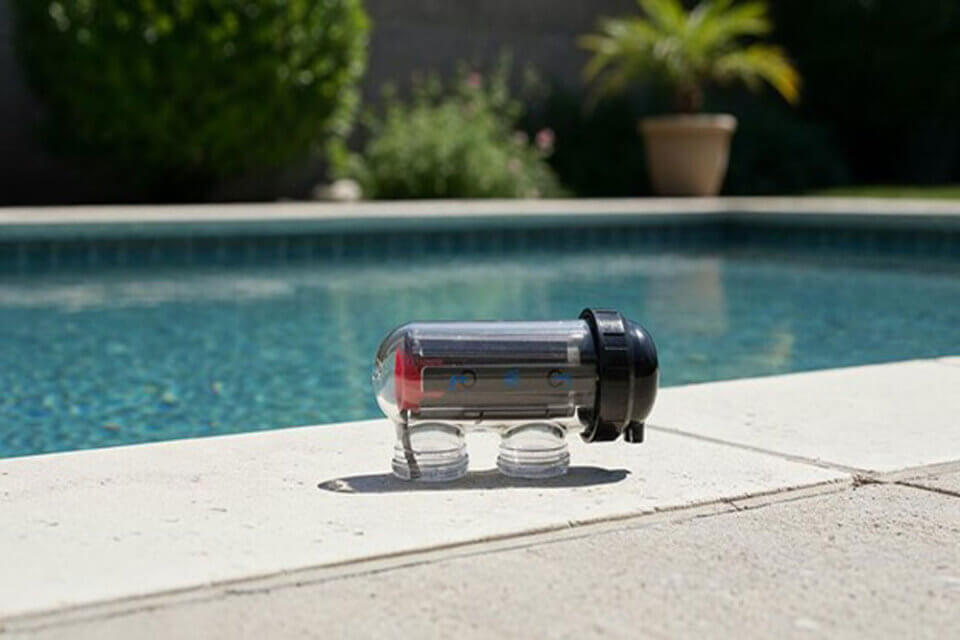Saltwater pools have become a popular choice for many homeowners because they offer a smooth, enjoyable swimming experience with fewer harsh chemicals. Instead of manually adding chlorine, these pools use a clever device called a salt chlorinator cell. This cell takes ordinary salt and turns it into chlorine through a process called electrolysis, keeping the pool water clear, fresh, and safe.
However, like all equipment, salt cells have a limited lifespan and eventually wear out. That’s where pool salt cell replacement becomes important. If you know when and why replacement is needed, you can prevent pool problems before they get worse. In this guide, we’ll explore the key signs that your salt cell may be failing and explain why timely replacement is essential for keeping your pool at its best.
Signs that your Salt Cell Needs Replacement
Reduced Chlorine Efficiency
One of the clearest signs of a failing salt cell is reduced chlorine production. Even when your salt levels are correct and the chlorinator is running, your pool may remain cloudy or develop algae growth. This means the cell is no longer converting salt into chlorine effectively.
If you notice murky water, algae patches, or constant dips in chlorine levels despite regular system operation, it’s a strong indication that your salt cell is losing efficiency. Replacing it will restore proper sanitisation and help you avoid ongoing maintenance headaches.
Error Messages or Warning Signals
Modern salt chlorinators usually have control panels that monitor the system. When something goes wrong, they display warning messages or error codes. Common alerts include “Check Cell” or “Low Chlorine Output”.
Sometimes, these warnings are caused by scale build-up or dirt on the cell plates, which can often be fixed with cleaning. But if the alerts keep coming back after cleaning, the salt cell itself may be nearing the end of its life. Continuous warning signals are your cue to look into a replacement.
Deterioration or Build-Up on Cell Plates
Over time, salt cells can develop calcium deposits, especially in areas with hard water. These deposits reduce the cell’s ability to generate chlorine properly. While regular cleaning with a mild acid solution can remove scaling, there comes a point when cleaning is no longer enough.
If you notice that the plates are badly corroded, cracked, or showing signs of heavy wear, it’s time for replacement. Ignoring damaged plates will only reduce the effectiveness of your pool system and increase maintenance costs.
Higher Maintenance Demands
If you find yourself adding chlorine manually or spending more money on chemical treatments, it’s another clue that your salt cell isn’t working properly. The main benefit of a saltwater system is that it reduces the need for extra chemicals, but a failing cell forces you to do the opposite.
When balancing the water feels like a constant struggle, even though you’re following the right steps, the problem is likely the salt cell. Replacing it will restore the system’s balance and save you time and money in the long run.
Age of the Salt Cell
Salt cells generally last between 3 and 7 years, depending on how often you use your pool, how well you maintain it, and the quality of the equipment. If your cell is getting close to this age range and you’re starting to see issues, it’s probably time to replace it.
Keeping track of the installation date helps you plan. Proactive replacement avoids last-minute stress and ensures that your pool remains clean and safe without interruption.
False Low-Salt Level Alerts
Sometimes, your salt chlorinator might alert you that salt levels are too low even though you’ve checked and confirmed they’re within the recommended range. This often happens when the cell is failing. A faulty salt cell may misread the levels, causing unnecessary warnings.
If this happens repeatedly, even with correct salt levels, it’s time to think about replacement.
The Importance of Timely Pool Salt Cell Replacement
Delaying pool salt cell replacement can create bigger problems for both your pool and your budget. Here’s what can happen if you wait too long:
- Poor sanitisation: Low chlorine levels make the pool unsafe, allowing algae and bacteria to grow.
- Unpleasant swimming conditions: Cloudy, unbalanced water affects the swimming experience.
- Higher operating costs: A struggling cell uses more electricity and forces you to buy extra chemicals.
- Damage to other equipment: Poor water balance can put stress on pumps, filters, and other pool parts.
Timely chlorinator cell replacement means fewer problems, lower costs, and more time to enjoy your pool. If you’re uncertain whether your cell is failing, consulting a pool professional can give you peace of mind. In fact, many pool owners rely on advice from experts, such as a pool builder in Geelong, to confirm whether replacement is the best step forward. They can also guide you in selecting and installing the right saltwater system based on your pool’s unique design and capacity.
Maximising the Life of Your Salt Cell
While replacement is unavoidable after a certain point, you can extend the lifespan of your salt cell with proper care:
- Clean the plates every few months, or more often if you see scaling.
- Keep pH, alkalinity, and calcium hardness levels balanced.
- Ensure salt levels stay within the recommended range.
- Avoid running the chlorinator at maximum output all the time.
Good maintenance practices will keep your salt cell working longer and save you money.
Concluding Thoughts
Salt cells are the heart of a saltwater pool system, and knowing when to replace them is essential for keeping your pool safe, clean, and inviting. Watch out for signs like reduced chlorine efficiency, frequent error codes, worn-out plates, and increased maintenance demands. By replacing your salt cell at the right moment and caring for your system regularly, you’ll continue to enjoy the many benefits of saltwater swimming for years to come.

